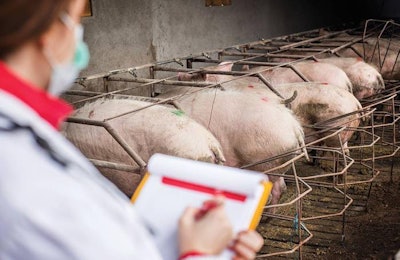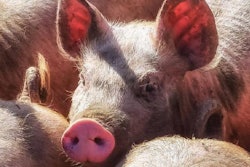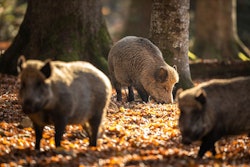
Since the disease first arrived in India in 2020, African swine fever (ASF) had — until recently — been confined to northeastern states.
In its gradual spread in India, the African swine fever (ASF) virus has been detected for the first time in Bihar and Uttarakhand.
More than 1,000 pigs have already died in the Bihar districts of Saran, Nalanda and East Champaran, reports The Telegraph of India. In the east of the country, authorities in all 38 districts of Bihar state are warned by the state government to monitor suspected outbreaks. Furthermore, they are required to ensure all pigs in any affected zone are culled.
Within the past few days, ASF is also reported for the first time in Uttarakhand. This state is in northern India.
Around 200 pigs have died in the Tehri Garhwal district, according to ANI News. As a consequence, a senior local official has ordered a halt to pig movements and the sale of pork products within one kilometer of each infected premises. Additionally, disinfection and fumigation of the area are to be carried out, and healthy pigs kept separate from sick animals.
The same source reports that ASF has also been detected this year in the northeastern Indian states of Assam, Mizoram, Sikkim and Tripura.
In the first week of July, Times of India reported that ASF has now been confirmed in seven districts of Nagaland. Latest districts affected are Dimapur and Kohima. A previous report indicated that the disease had been present in the northeastern state of Nagaland since March.
ASF spread from northeast India since 2020
Since the start of 2022, local media have also described suspicions of disease or confirmed ASF outbreaks in Manipur and Meghalaya — also in the northeast of India.
ASF was first detected in India in 2020 in the disputed territory of Arunachal Pradesh, and later that year in Assam, Manipur and Meghalaya. There were outbreaks in most of these states also in 2021.
After reports of new ASF outbreaks in the north and east of India, Kerala has begun preparations to prevent outbreaks. The state is located in the far southwest of India. As well as a statewide ASF action plan, The Hindu reports that Kerala pig owners are directed to strengthen biosecurity measures and to prioritize waste management.
Philippines: New cases, intensified disease control
For the past three years, the country has undertaken efforts to control ASF. As new cases are confirmed by provincial authorities, they introduce new measures to prevent the spread of the virus.
One of only three regions of the country to have remained free of ASF is Western Visayas. In the province of Negros Occidental, the Philippine News Agency (PNA) reports that border checks are being intensified. As the leading producer of backyard pork in the country, the move aims to protect the province’s many hog raisers from the disease and the economic damage it causes.
In the same region, authorities in Antique province are calling for extra vigilance. This call came after significant recent seizures of canned and frozen pork. Originating on the island of Luzon, sales of these products are banned in Antique because of the risk of ASF transmission. Furthermore, more checks will be carried out at ports and airports to prevent the trade and maintain the province free of ASF.
In the Northern Mindanao region, the first cases of ASF have been confirmed in the province of Camiguin, according to PNA. After blood testing confirmed presence of the virus, all pigs within 500 meters of the affected premises were culled. Pig owners have been urged to carry out enhanced biosecurity, and to end feeding swill and food scraps to their animals. Furthermore, they must now obtain official clearance before slaughtering their pigs, and incoming trade in pork products has been suspended.
Biosecurity breach at farm linked to ASF infection
Also increasing disease controls is Zamboanga City. Since ASF was first detected in this area in early May, PNA reports that around 1,200 hogs have died, and more than 500 have been culled. The city is located in the northwest of Mindanao.
In the southeast of the same island, one pig has tested positive for the ASF virus at a Davao City slaughterhouse. It was traced back to a unit in South Cotabato, prompting increased testing of pigs for the disease across the city, as well as the temporary closure of a market.
And in South Cotabato province, PNA reports that around 900 pigs have been culled due to ASF. Affected were two premises. Of these, one was a commercial farm, where 850 animals were destroyed after a breach in biosecurity was revealed. While investigations continue, pig movements in the area have been halted. Provincial authorities have set aside funds to support backyard hog raisers affected.
Since the first detection in the Philippines in 2019, ASF virus has been detected in 53 of the country’s 81 provinces, according to this source.
Two more ASF outbreaks in Nepal
With a further two outbreaks confirmed at the end of June, Nepal’s total has reached 14.
At the end of March, the national veterinary authority registered the country’s first ever cases of ASF to the World Organisation for Animal Health (WOAH).
So far, ASF has been confined mainly to Bagmati, a zone in the Central Development Region. Latest cases were detected at the end of June on two farms — with 107 and 200 pigs — also in Bagmati.
Directly affected by ASF outbreaks in Nepal so far have been around 5,650 pigs. All the premises were described as “farms” in WOAH reports, each with a herd of between 18 to 2,135 animals.
Further cases in South Korean wild boar
As of July 11, the number of confirmed ASF cases in the nation’s wild boar stands at 2,644, according to Pig People. This is 11 more than on June 22.
In addition, there have been 22 outbreaks among South Korean domestic pigs — most recently in late May.
ASF developments elsewhere in Asia
Russia’s animal health agency has declared to the WOAH that the ASF situation in Omsk has ended.
After a 16-month hiatus, ASF virus was detected again in Omsk oblast in early May. Twenty of the 346 pigs at a farm there died, and the rest have been destroyed. No subsequent outbreaks cases have been reported in this region of the Siberian federal district.
Latest notification to WOAH from the authorities in Hong Kong indicate no new cases of ASF have been detected. In May, one wild pig found in a village tested positive for the virus. Since then, no further cases have been found in the territory.
For 11 months, no new cases of ASF have been detected in Indonesia’s Manokwari regency. Up to August of 2021, pig mortalities from ASF in this region had reached 1,550, reports Link Papua. Nevertheless, authorities continue to test pigs to ensure the area remains free of the virus. Additionally, a ban on movements of pigs on and out of the region remains in place.
Manokwari regency is in West Papua province in eastern Indonesia. Previously, ASF has also been reported in the Indonesian provinces of East, Central and West Kalimantan.
View our continuing coverage of the global African swine fever situation.
















